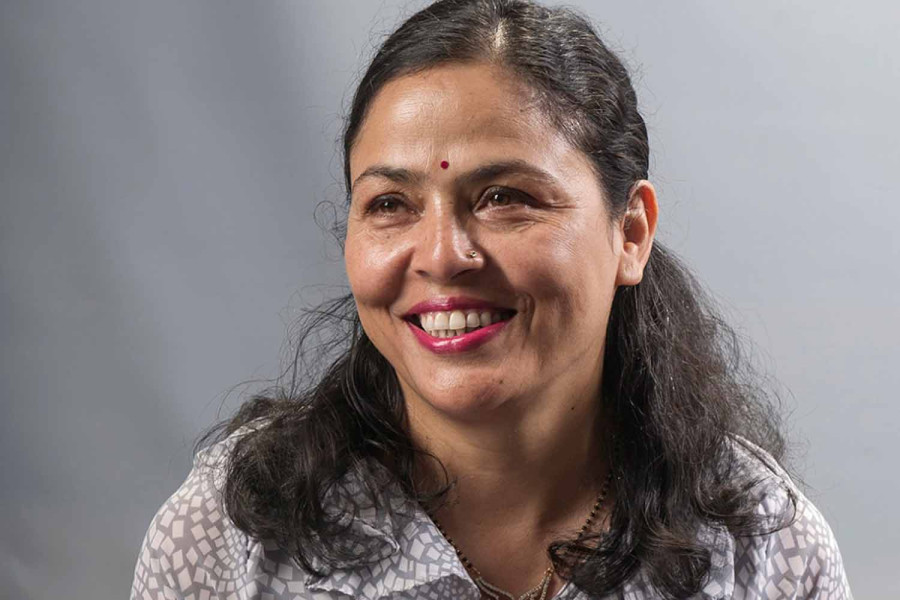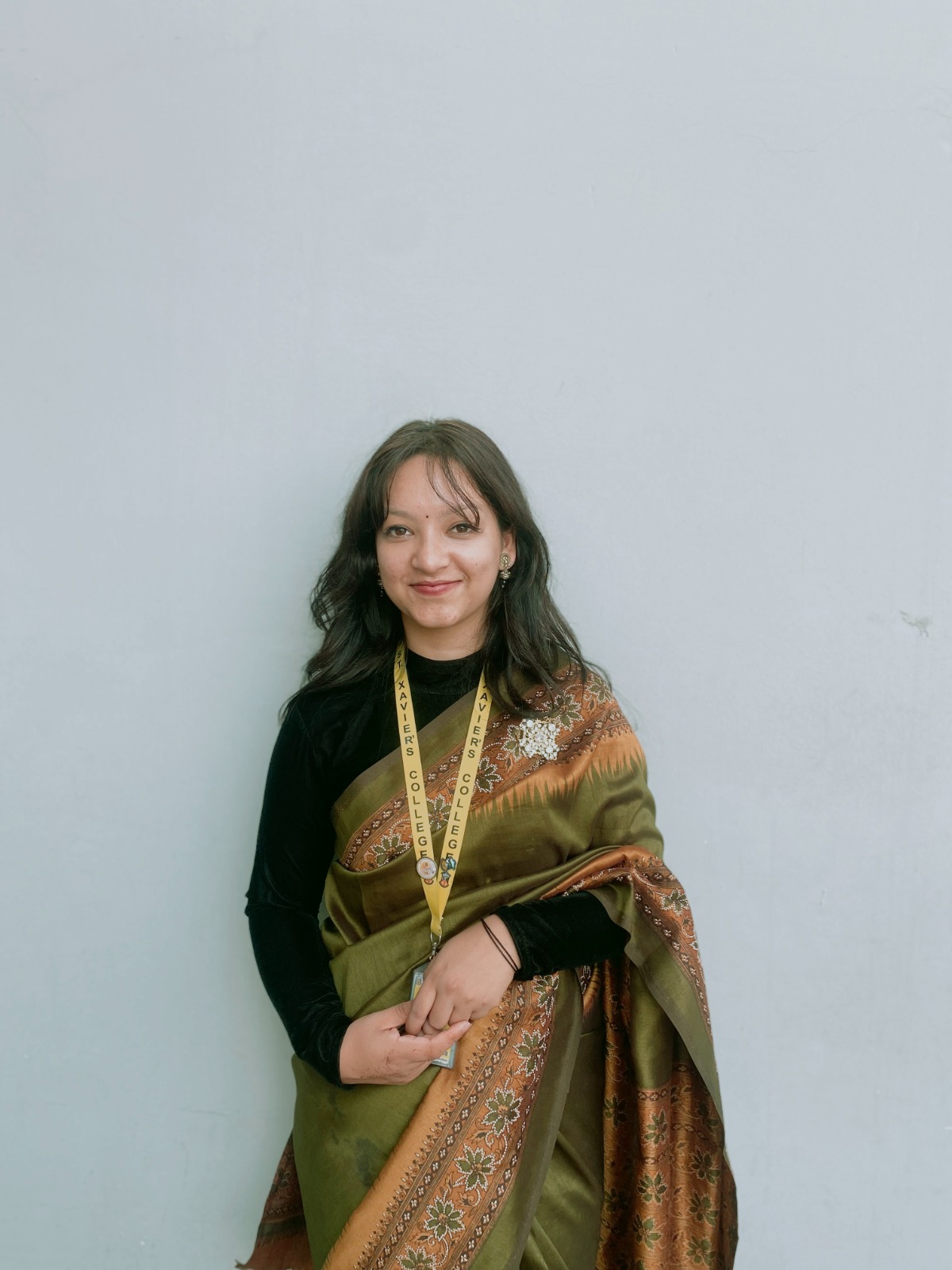Books
I hid poems from my parents growing up
Influenced by real-life encounters, Jyoti Jungle’s writings explore social struggles and women’s resilience.
Aarya Chand
Author Jyoti Jungle is known for her evocative writings that explore human emotions, social struggles, and women’s resilience. She has published five books: Pahadka Man (2006), a poetry collection; Aksharma Timi (2009), a ghazal collection; Mukta Samaya (2013), a poetry collection; Chhaya (2018), a short story collection; and Adha Shir Uchalera (2023), her latest poetry collection.
She is currently working on a book about a girl’s struggle to obtain her master’s degree and avenging her sister’s death.
In this conversation with the Post’s Aarya Chand, Jungle shares how real-life encounters influence her storytelling, why she centres women’s voices, and how she captures strength and reflection through her work.
What’s the meaning behind your name, Jyoti Jungle?
I was scared my parents wouldn’t let me study or write poems. That fear is what led me to adopt the pen name Jyoti Jungle. I didn’t want my family to know I was writing, so hiding behind a pseudonym felt safer. However, my Nepali teacher submitted my name to a poetry competition during my bachelor’s. The photos from the event ended up in a local newspaper, and just like that, my secret was out. Strangely, after that, no one said anything.
The name itself carries a special meaning. One of my closest friends, my roommate since class 8, used to write poems under the name Durga Banbasi—which means Durga, the forest dweller. I was pondering what name to use for my first publication when it struck me—if she’s the one who dwells in the forest, I could be the light within that forest. That’s how Jyoti Jungle came to be.
There’s more to it. People often associate the word jungle with fear, darkness, and the unknown. But I wanted to represent light within that darkness—a symbol of brightness where others might only see shadow. Also, I knew my caste would change after marriage anyway, so I felt free to choose a name that wasn’t tied to traditional expectations. The name gave me freedom and a space to write and be myself.
Can you tell us about your story collection ‘Chhaya’? What themes or characters does it explore?
‘Chhaya’ features a range of characters, especially women navigating complex emotional and social realities. One story, ‘Antim Astra’ (The Final Weapon), follows a woman whose husband works abroad. While he remains devoted, she falls in love with someone else in Nepal. Upon discovering the truth, the husband takes his own life. The idea for this story originated from my fieldwork—while gathering data for my office, the narrative delves into the emotional weight of such choices.
Another story is about a young girl deceived by a man who pretends to love her, only to attempt to sell her into prostitution. When the sale fails, he hides her, and she eventually becomes pregnant. Realising he’s the father, he marries her.
This is a real story. I met this woman—now married to him and running a shop—and was struck by her resilience. In my version, the woman demands justice and calls for his imprisonment. Many stories in ‘Chhaya’ are similarly based on real-life experiences, exploring strength, choice, and survival.
‘Mukta Samaya’ explores themes of freedom and time through poems. What inspired you to delve into these concepts, and what message do you hope to convey to readers?
The themes of freedom and time in my book ‘Mukta Samaya’ stem from my emotional journey. Through my poems, I sought to break free from the burdens of time and pain, believing that liberation from these forces leads to a better existence. The title reflects this desire for freedom. Many of these poems, written over eight to ten years, explore my thoughts on my country, society, and personal experiences, especially influenced by war and its impact. I’ve witnessed war for over twelve years, and these events inspired poems about wartime experiences, pain, trauma, and healing. I wanted to show how, even through trauma, freedom is possible. There are also poems about love, country, and women, reflecting my thoughts and the circumstances I’ve lived through.
You have written extensively in both poetry and short story formats. How does your approach to writing differ between these two genres?
I began my writing journey with poetry and have since published three poems and a ghazal collection. However, some topics didn’t fit poetry, so I wrote stories. While my short stories have been well-received, poetry remains my natural outlet for expression. Poetry allows me to convey emotions succinctly, but stories require more time, structure, and effort. Though my stories may lack the emotional immediacy of poetry due to their structure, I still find poetry to be the easier medium for me.
Many of your poems, such as ‘Desh Bina’ and ‘Refugee’, explore the emotional and psychological impacts of displacement. Could you share some personal or societal experiences that have influenced your work on this theme?
This theme, especially in the context of refugees, was inspired by my visits to the large camps for Bhutanese refugees in Jhapa and later in Morang. At that time, many of them had been in Nepal for years but still couldn’t call it their home, nor could they return to Bhutan.
As I travelled between Jhapa and Biratnagar, I often reflected on the sense of displacement they must have felt—living in limbo without a country to call their own.
This poem is dedicated to all refugees, to everyone who has ever felt what it’s like to live without a home, unable to call anywhere their own.
Your poems on ‘Sahitya Sangraha’ span a wide range of themes and styles. How important is it to bring variety into your writing, and how has your creative focus evolved over time?
Writing isn’t possible without interest, but beyond interest, I believe a writer must offer variety. The taste of each poem should be distinct, whether in the voice, the subject matter, or the style, because if everything feels the same, readers lose interest. Writing about the same thing can become monotonous, not just for readers but for the writer, too. That’s why I always ask, am I repeating myself? Then, I also look at the broader literary history. We are walking the path paved by greats like Laxmi Prasad Devkota and Madhav Prasad Ghimire, but we shouldn’t merely replicate what they wrote. Our code—our approach—must be different. As a writer, you must critique your work, examine it from various perspectives, and explore how to write with fresh insight.
Earlier, my work went through phases—of rebellion, emotion, and sensitivity—mostly directed towards society. But now, after completing those phases, my focus has shifted inward. I’m asking: ‘Who am I?’ This new direction is more spiritual, exploring questions of selfhood and existence. My writing is evolving, and I’m embracing this change.
Jyoti Jungle’s five book recommendations
Bholi Basne Bihan
Author: Krishnabhusan Bal
Publisher: Sajha Prakashan
Year: 1984
For those who have just started writing poems, this book by Bal offers valuable insights into the art of poetry.
Oh Pengdorje !
Author: Raju Syangtan
Publisher: Publication Nepalaya
Year: 2023
Syangtan’s poems are a powerful example of how to write about people from the working class and those from marginalised communities.
Madhabi
Author: Madan Mani Dixit
Publisher: Sajha Prakashan
Year: 1983
This novel reflects on the social development of Nepali society and its evolution into its current state.
Abstract Chintan Pyaj
Author: Shankar Lamichhane
Publisher: Sajha Prakashan
Year: 1967
Lamichhane shows how we can meaningfully write about daily life, human existence, various professions, and the environment.
Karagar
Author: Banira Giri
Publisher: Sajha Prakashan
Year: 1985
Set in Kathmandu, it portrays the struggles of an elderly and unmarried woman, and her relationship with a married man.




 15.12°C Kathmandu
15.12°C Kathmandu










